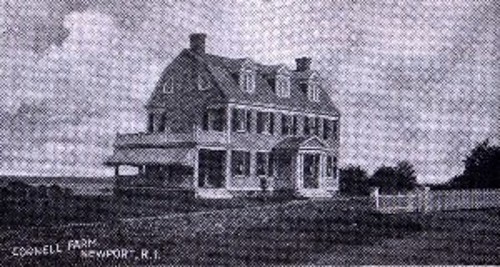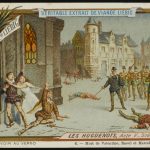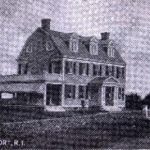10th great grandmother. Rebecca Cornell, born 25 Oct 1600 in London, England and died 08 Feb 1673 in Portsmouth, Rhode Island. Spouse: Thomas Cornell.
Rhode Island Historical Cemetery Commission. http://www.rihistoriccemeteries.org/webdatabase.aspx
On the night of Feb. 8, 1673, Thomas Cornell rushed into the sitting room where he had earlier left his mother Rebecca Cornell. On the floor he found a body, badly burned. He suspected he’d found a drunken Indian who had fallen into the fire.
But as he rushed close, he declared: “Oh, Lord! It is my mother!” And so began the strange case of the murder of Rebecca Cornell.
The Cornells were a well-respected family in Portsmouth, R.I. Thomas and Rebecca, originally from England, ran an inn in Boston. They left Massachusetts in the wake of Ann Hutchinson’s expulsion for her religious beliefs. The Cornells sympathized with the more tolerant society Roger Williams was creating in Rhode Island.
THE DEATH OF REBECCA CORNELL
Thomas senior died in 1655. Both Thomas Cornells, senior and junior, were well-regarded citizens, serving public office. By 1673, Rebecca had entrusted her estate to her son Thomas.
On the day she died, Thomas spent more than an hour talking with his mother in her sitting room. Then he was called to dinner. The evening dinner was salt mackerel, which Rebecca did not eat. She said it made her dry in the night.
Thomas sent his son Edward to ask Rebecca if she wanted boiled milk or some other supper. As Edward tried to rouse his grandmother, he was alarmed by a dog bounding from the sitting room. Something was amiss and Edward ran to fetch a candle and raise an alarm. When Thomas returned to the sitting room with Edward, he found the body on the floor.
Kneeling down, Thomas first tried some Indian phrases to communicate with the injured person. On closer inspection he recognized his mother. The first coroner’s inquest was quick and to the point. Rebecca Cornell had died in a fire. She had probably fallen asleep, dropped ash from her pipe on herself and burned to death. But four days after the death, Rebecca’s brother John gave a strange testimony.
GHOST SIGHTING
He was asleep in bed when “he felt something heave up the bedclothes twice, and thought somebody had been coming to bed to him, where upon he awaked, and turned himself about in his bed, and being turned, he perceived a light in the room, like to the dawning of the day, and plainly saw the shape and appearance of a woman standing by his bedside where at he was much affrighted, and cried out, ‘in the name of God what art thou?”
The apparition answered, ‘I am your sister Cornell,’ and twice said, ‘see how I was burnt with fire.’ And she plainly appeared unto him to be very much burnt about the shoulders, face, and head.”
The vision reinvigorated the investigation. Rebecca’s brother interpreted the vision to mean that his sister accused someone of burning her intentionally. Rebecca’s body was inspected a second time, and this jury found a suspicious wound in her stomach. A new version of events began to take shape, and Thomas Cornell was charged with murdering his mother.
THE TRIAL
At trial, witnesses painted an unpleasant picture of life in the Cornell home. Rebecca Cornell had complained about her treatment. She had to work on the farm. She went to bed without her bed made up or warmed. And she complained that Thomas was skimpy in heating the home and would not provide a good fire.
Her son declined to hire a maid to look after her. And she and Thomas argued over whether rent should be paid for staying at the house and whether he should pay her or vice versa.
Rebecca Cornell, two witnesses testified, had contemplated killing herself, either by stabbing herself or drowning herself. Further, she had told some, she planned to leave Thomas’ house and move in with her son Samuel in the spring. Of particular concern to Rebecca: Thomas’ second wife, Sarah, who she disliked.
Patience Coggeshall testified: “She was afraid there would be mischief done. Her daughter-in-law was of such a desperate spirit, for not long since, said she, she ran after one of the children of his first wife, with an Axe, into her house; but she prevented her striking the child. Yet she did not live with any of her other children because she had made over her estate to her son Thomas. If she had thought her son Thomas first wife would have died before her, she would not have made it over to him.”
CREDIBILITY GAP
Meanwhile, other witnesses questioned Thomas’ story about his mother refusing mackerel, charging that she had been known to eat it.
John Pierce suggested Thomas Cornell was glad his mother was gone. He testified: “Thomas Cornell said that his Mother in her life time had a desire to have a good fire, and further said, that he thought God had answered her ends, for now she had it.”
The jury convicted Thomas Cornell of murdering his mother with virtually no evidence that he had done so. Two years after he died on the gallows, his widow Sarah was charged with assisting in the murder, along with a local Indian. She was not convicted. However, the case of Rebecca Cornell caused the people of Rhode Island to debate whether spectral evidence should be used in criminal cases at all.
Information from: https://www.newenglandhistoricalsociety.com/1673-murder-rebecca-cornell-and-good-fire/




